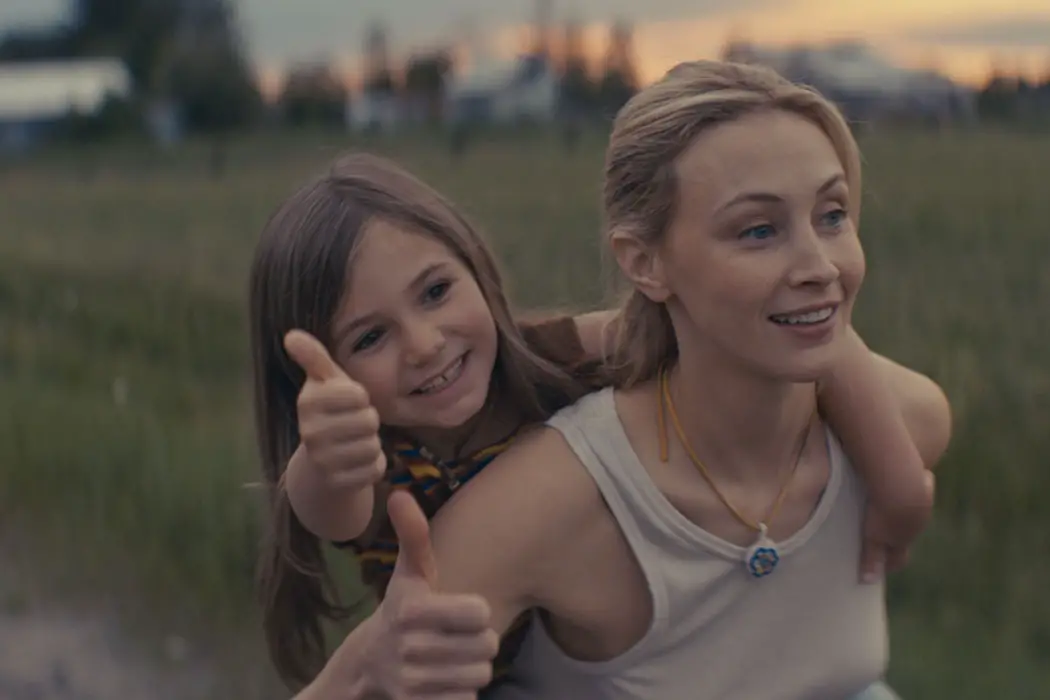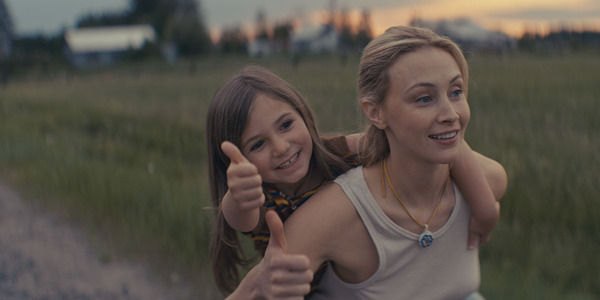Toronto International Film Festival 2022: Interview With Actress Sarah Gadon Of NORTH OF NORMAL

Wilson is a cinema enthusiast based out of Toronto, Canada.…
Canadian actress Sarah Gadon has always had a keen eye for interesting roles, and she keeps that streak going with her portrayal of an imperfect mother in Carly Stone‘s North of Normal. Gadon spoke with Film Inquiry during the film’s world premiere at this year’s Toronto International Film Festival.
Wilson Kwong for Film Inquiry: Maybe you can start off by talking about your relationship with the character, Michelle. Because on paper, she’s extremely flawed, but through your performance and the film itself, she’s obviously more nuanced than that.
Sarah Gadon: Well when I read the script, I thought it was a really beautiful story, but I definitely did not initially connect with Michelle. I think I just come from such a different background because I had such a stable and well-adjusted childhood and adolescence. And I had such stable parents, so it was hard for me when I read the script, because I think I was pretty critical of her. But then I started to peel back the layers of that and really thought that it would be an interesting challenge. Because when I read the character, I also thought she came off a little ditzy. And I was like, I don’t think this woman is ditzy. And I don’t think I want to play a version of her that’s ditzy. I think this is a person who had a lot of hopes and dreams for themselves, and then life got thrown really hard at her and she had no tools to cope with it. And that’s really just how I see Michelle. I see her as a beautiful person, but I also see her as someone who is completely ill equipped to deal with all of the situations that she was in. You watch her in the film make the wrong choice over and over and over again, but you still have to want to have space in your heart for her in order for the movie to work and be compelling.
That definitely comes through in the film. So was all this your own added take on the character that came during your performance, or was it all in the script originally too?
Sarah Gadon: No, I think that Carly (Stone) really saw her that way too. And I think she was also like, “Absolutely I don’t hate Michelle.” And I read Cea‘s (Sunrise Person) story, and there’s something really beautiful about her as a person, but she just keeps making the wrong choices and that’s what’s tragic about her childhood, really.
Did you also read Cea’s book as part of your research for the role?
Sarah Gadon: Yeah I read the book. I loved the book and then I was able to talk to Cea a bit about her mom. And then while we were shooting, she actually came out to set. And so we got to spend a little bit of time together.
I know you’ve been in a few things that are based on books, so I’m curious if you always try to read the source material before taking on a role.
Sarah Gadon: I do. I think that an adaptation is a completely different artistic medium. So the film is inevitably always going to be different than the book, and that’s a good thing. I don’t necessarily read the source material because I’m looking to do exactly what the book is doing in the film. But I do think that it offers a lot of information about the world that you’re inhabiting and that is also really important as just research. And then I also think that when you’re doing an adaptation, there is always the part of the fan base of the movie that come to the movie because they were fans of the novel. So it would be doing them a disservice if you didn’t read the original source material.

And with a character like this, where there’s always the obvious interpretation on the surface, but a deeper interpretation as well, do you ever think about how the audience interprets your performance? Or are you just trying to stick to portraying what you’ve prepared based on the script?
Sarah Gadon: No, not necessarily. I think the way that I work is that I’m constantly exploring. So even on set, it’s like you’re constantly exploring the possibilities of what a scene can be. And often there are many different possibilities of what that scene can be. And part of my job as an actor is really to just give over all of those possibilities to the director and the editor and allow them to craft and shape the movie that they want to make. So often in the rehearsal process, you get to a place with a director where you’re on the same page. So it’s not like you’re getting to set and think, “Well I think this is about that.” And they’re like, “Well I think this is actually the opposite meaning.” So you’re in the same ballpark, but then when it comes to the nuance of what a scene can be, there are just so many possibilities. And that was something that I really tried to push Carly on, especially in the scene where Amanda (Fix) and I are having our biggest climactic moment of the movie and she gets out of the car and we have it out before she takes off. I think sometimes directors don’t want to rehearse the most dramatic parts of the film before you go, because they think that you’re going to run out of gas. But it’s actually great to rehearse them over time without any expectation put on them, so that when it comes to the day you can just really tease out as much of what it can be.
And with your performance in the film, I found that your voice and overall disposition was different from what I’ve seen before. It’s not that there was a specific accent to it, but there was certainly something a bit bubbly about the way Michelle talks, and the way she carries herself is very unique.
Sarah Gadon: I really just think that’s how I am when I get high. And I think that Michelle is high a lot of the time. So that was the inspiration for that, I was like, “This woman is smoking a lot of weed all the time.” So there has to be that inside of her all the time.
Got it! And what about working with the two younger actresses? I assume it’s always a very different experience from working with more adult and veteran type performers.
Sarah Gadon: Well, I asked Carly if I could spend as much time as I could with Amanda and River (Price-Maenpaa) before we went to camera. And because River is a child and with the union rules and laws that we have about shooting with child performers, you only really get to work with them a few hours every day on set. So I knew that it was really, really important to have a relationship with her before we got to camera so that she would feel comfortable with me and safe with me. And we would be able to have a shorthand, because you move so fast on set. And I also got to know her family because River‘s whole family was with her when she shot the movie. So I got to meet her parents and her brother and spend time with them. And I know how important that is because I was a child actor myself. And as much as there is the child performer, their family is just as much a part of the filmmaking as the child is in many ways. Because they’re on set every day, they’re supervising, they’re helping that child prepare for the role. So it was just as important to me to have a relationship with River‘s entire family as it was to have a relationship with her.
And in many ways it was the same with Amanda, because she’s only 21, and I think she was 20 when we shot the film. It was one of her first jobs and I wanted to be able for her to really feel like we had a relationship and a connection and got to know each other and spend time together so that she would also feel really safe and connected with me. And so Carly was really amazing because she gave us as much time and space to do that as she could, before we started shooting in the rehearsal process. And then when it came to shooting, Amanda and I spent periods of the film living together and we really just fully bonded, which I think was really helpful.
I want to end off by talking about your transition to directing, as I know it was just announced that you’ll be adapting Heather O’Neil’s Lullabies for Little Criminals (congratulations!). I assume you’ve probably been thinking about directing for a while now, so on your last few projects, including this one, did that change your approach or process as a performer?
Sarah Gadon: I think every time I make a film, it’s a completely different experience. I’ve always been very curious about all aspects of filmmaking and I’ve always been really close with the directors that I work with. So I’m not necessarily looking at it being like, “Oh, would I do that?”, but it’s really just watching and learning. And I think I’ve always been doing that. Not necessarily with an eye on directing, but just because as an actor it’s just so important to be observant, and be aware, and be as much as part of the entire film as you are just as a part of the scene.
Film Inquiry would like to thank Sara Gadon for taking the time to speak with us!
Does content like this matter to you?
Become a Member and support film journalism. Unlock access to all of Film Inquiry`s great articles. Join a community of like-minded readers who are passionate about cinema - get access to our private members Network, give back to independent filmmakers, and more.
Wilson is a cinema enthusiast based out of Toronto, Canada. He escapes from his day job by writing random thoughts about cinema on the internet. Although he has a longstanding penchant for Hong Kong cinema, he considers himself to be an advocate for Asian cinema in general. He has been attending the Toronto International Film Festival every year since 2005, and more of his work can be found on his website: www.wilson-kwong.com.













